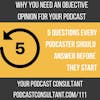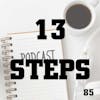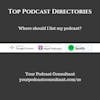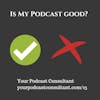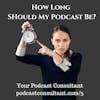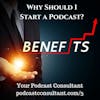What Happened When I Ignored My Own Advice

I have advice that I tell my clients: Record a few test episodes so you can see how long it will take to create an episode - then pick your schedule. Get some feedback from someone you are not related to, or didn't grow up with. You need constructive...
I have advice that I tell my clients:
Record a few test episodes so you can see how long it will take to create an episode - then pick your schedule.
Get some feedback from someone you are not related to, or didn't grow up with. You need constructive feedback.
As you probably know, it can be really helpful to get feedback from other people. But it's not always easy to find somebody who will give you an honest, unbiased opinion. That's why it can be a good idea to ask for feedback from someone who is not related to you. For example, if you're thinking about starting a podcast, you could ask a friend or colleague for their thoughts on your idea. Or if you're working on a project, you could ask someone for their feedback on your progress. Whatever the situation, getting some feedback from someone who is not related to you can be incredibly valuable. So next time you need some input, don't be afraid to reach out to someone who can give you an objective point of view.
I have spoken about this before in other episodes.
While I recorded a few test shows, I didn't spend much time on this (two episodes) and I didn't get any feedback.
When I saw my supply chain of content was not as fruitful as I thought, I ignored it and went with my heart.
In the end, the podcast took more time than planned (they always do) but I am already doing multiple podcasts and understand the value of my time. Consequently, I told the audience of that show where to find me, and I am taking some extra time to learn from my own mistakes.
You're never going to be perfect. All you can do is fail fast, and learn from your mistakes and move on.
Podcasting Requires Focus
Creating a podcast can be a daunting task, but there are some simple steps you can take to make the process more manageable. First, decide on the format of your podcast. Are you going to interview guests, host debates, or simply provide commentary on current events? Once you've decided on the format, it's time to start planning your content. What topics are you going to cover? Who are your target audience? What tone do you want to set for your podcast? Once you have a good idea of what you want to achieve with your podcast, you can start measuring how long it will take to create each episode. If you're interviewing guests, for example, you'll need to factor in time for research, outreach, and scheduling. If you're debating or commenting on current events, you'll need to allow time for research and preparation. By taking the time to plan ahead, you can ensure that your podcast is engaging and well-produced.
I Help Podcasters - It's What I Do
If you need help, come visit me at www.podcastconsultant.com
Fall in Love with Podcasting. CLICK HERE to ignite your passion!
The only worse thing than a mistake is a mistake. The ego. Yeah, that one's all my fault. And today, we're going to talk about a podcast that I just pulled the plug on. And I kind of want to smack myself and go, you didn't follow any of your own advice. Welcome to your podcast consultant, small lessons with big value. Now, he wants to work with you. He's your podcast consultant, Dave Jackson.
I kind of want to laugh at myself. It's one of those when you look back and you go, yeah, okay, I see what I did there. I said in an episode earlier, where, you know, Yoko Ono, John Lennon never said, Hey, honey, you might want to work on that singing thing. And I did a show called the podcast trailer show. Now. I started this because trailers started coming back in popularity. They were really popular in the early days of podcasting. And when I saw people started to share the morals like, Hey, I'm gonna go play in traffic, people are talking about podcast trailers, let's make a podcast about podcast trailers. So that was the idea. And then, of course, I would be mentioning the school of podcasting, in that particular show. And I had a resource where I could find lots of trailers. So what I did is I went over and I did a couple of episodes, and I was like, wow, this is allowing me to make a few episodes in a really short amount of time, this is exactly what I want. Because I don't have a lot of time for another podcast, your time is your most valuable possession. And so many times we just give it away. So I did a whopping two episodes. And did I get feedback from somebody not named mom? Nope. In fact, I actually designed this podcast on paper. And when I finally did listen to it, I was like, Ooh, whoa, hold on a second, because about 30% of it was advertising. And I was like, Oops. So I fixed that.
But the other problem I had is you have to look at yourself and say, Where am I going to get the content for this particular show? So in this case, it was I wanted podcasters, who had a trailer to send it to me. And I assumed that most people put their website in their trailer, like, for more information, go to podcast consultant.com. And I'm here to tell you probably the last eight trailers that I had, did not do that. The other problem was, this was me gathering these promos, these trailers. And even though it's their trailer, it's still my brand. And a lot of these trailers, understandably, when you think about it, often, this is the first thing you record didn't sound that good. And I actually started doing disclaimers where I would say, Hey, I found these shows today. That's why I'm displaying them here in this episode, not so much that the show is good. And I was like, yeah, that's, that's not really, that doesn't roll off the tongue. And so I started to put together some episodes, and it was just taking way too long. In fact, that last official episode was about four minutes long. And it took me about 40 minutes.
Now, the first couple I did, they were taking me somewhere around 10 to 15 minutes an episode, but it was hard to find trailers. The trailers weren't very good. And I rarely had somebody give me their website, I even created a form and that kind of help. But in the end, I just looked at my watch, and I said, You got 24 hours in a day. And I could come over here and play with this little fun little podcast, or I can take that time and invest it in my coaching in the School of podcasting. And really, instead of trying to get a new audience, how about taking better care of the current one I have, and it just was just one of those things where that little voice had been going off in the back of my head. And I just went, yeah, that's, we're gonna chalk this one up to a mistake. And had I done more than a couple of episodes to kind of start it off. I would have seen where, ooh, I'm running out of content. And the content I'm getting isn't very good. The tagline was, I was going to help you find your next favorite podcast. But these promos didn't really make you want to go listen to them.
They were actually in many cases, pretty bad. And so I heard a great phrase, I was interviewing David Hooper. He's a friend of mine. He does the build a bigger podcast show. And he lives in Nashville and he said, you know songwriters say a good song is written A great song is rewritten. And it just goes back to I basically published my first rough draft was like, Hey, this is quick and fun. Let's go, I didn't get any feedback. And had I, I probably would have had somebody say there's too many ads in this, and then fix that there. So the first impression would have been much better.
But the bottom line was, it just took more time. So if you're thinking of doing a podcast, you can actually buy the microphone. Or you can just use your phone and go through the steps of actually creating an episode, which is what I tell my clients, I just didn't follow my own advice, so that you can see exactly how much time it takes to create an episode and then ask yourself is that episode, something I would be proud putting out into the public?
Now I kind of hesitate to say this, because I do have people on the other side of the fence, who have been re recording and re recording and re recording that first episode. And I'm not making this up for years, when it's perfectly fine to go out into the public. So it's the joy of finding that happy medium. And I have an episode about how to, you know, when you're ready for the public. And that's where you do the step that I didn't do. And that is you get some feedback from somebody not named mom and from people that you didn't grow up with. And I can help with that. And the last point I want to make is, it's great to be excited about something I was actually excited about this show. But I in the process of letting my excitement take over, I kind of ignored the logic of my steps that I tell all of my clients be sure to do this be sure to do that. I just kind of was like up and jumped into the pool. And I made it 26 episodes when I went yeah, this is not I should have slowed down.
I should have done some test shows, I should have looked at my watch to see how long it was gonna take. And so the big question is Dave, how did you shut down the show? I put out an episode. It's coming out this Wednesday that says, hey, thank you so much for listening. I appreciated your attention. I have these other shows like this one, because that show was shorter go. If you like short shows about podcasting, check out your podcast consultant, because I'm giving you tips over there. So always give your audience a place where they can find you if there is a place for them to find you because they come for the content, but they stay for the host. And so some of that audience, not all of it, but some of that audience is going to follow me over here or to the school of podcasting or to ask the podcast coach, or the podcast rodeo show or the podcast review show. Hence, I really didn't need another podcast about podcasting.
But if you're looking to start a podcast about anything, I can help, I'm Dave Jackson. I help podcasters is what I do. My website School of podcasting.com helps people plan, launch and grow their podcast or if you want, we can work one on one. You can follow and subscribe this show by going to podcast. consultant.com In fact, everything you need there. If you want to sign up for a strategy call podcast. consultant.com want to check out the back episodes podcast. consultants.com want to sign up for the School of podcasting. You can do it at podcast consultant.com Thanks so much for listening. I'm Dave Jackson. I help podcasters it's what I do.
Featured Episodes
A good place to start

















